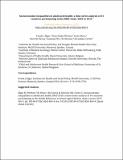Socioeconomic inequalities in adolescent health 2002-2010 : a time-series analysis of 34 countries participating in the Health Behaviour in School-aged Children study
Abstract
Background Information about trends in adolescent health inequalities is scarce, especially at an international level. We examined secular trends in socioeconomic inequality in five domains of adolescent health and the association of socioeconomic inequality with national wealth and income inequality. Methods We undertook a time-series analysis of data from the Health Behaviour in School-aged Children study, in which cross-sectional surveys were done in 34 North American and European countries in 2002, 2006, and 2010 (pooled n 492 788). We used individual data for socioeconomic status (Health Behaviour in School-aged Children Family Affluence Scale) and health (days of physical activity per week, body-mass index Z score [zBMI], frequency of psychological and physical symptoms on 0–5 scale, and life satisfaction scored 0–10 on the Cantril ladder) to examine trends in health and socioeconomic inequalities in health. We also investigated whether international differences in health and health inequalities were associated with per person income and income inequality. Findings From 2002 to 2010, average levels of physical activity (3·90 to 4·08 days per week; p<0·0001), body mass (zBMI −0·08 to 0·03; p<0·0001), and physical symptoms (3·06 to 3·20, p<0·0001), and life satisfaction (7·58 to 7·61; p=0·0034) slightly increased. Inequalities between socioeconomic groups increased in physical activity (−0·79 to −0·83 days per week difference between most and least affluent groups; p=0·0008), zBMI (0·15 to 0·18; p<0·0001), and psychological (0·58 to 0·67; p=0·0360) and physical (0·21 to 0·26; p=0·0018) symptoms. Only in life satisfaction did health inequality fall during this period (−0·98 to −0·95; p=0·0198). Internationally, the higher the per person income, the better and more equal health was in terms of physical activity (0·06 days per SD increase in income; p<0·0001), psychological symptoms (−0·09; p<0·0001), and life satisfaction (0·08; p<0·0001). However, higher income inequality uniquely related to fewer days of physical activity (−0·05 days; p=0·0295), higher zBMI (0·06; p<0·0001), more psychological (0·18; p<0·0001) and physical (0·16; p<0·0001) symptoms, and larger health inequalities between socioeconomic groups in psychological (0·13; p=0·0080) and physical (0·07; p=0·0022) symptoms, and life satisfaction (−0·10; p=0·0092). Interpretation Socioeconomic inequality has increased in many domains of adolescent health. These trends coincide with unequal distribution of income between rich and poor people. Widening gaps in adolescent health could predict future inequalities in adult health and need urgent policy action.
Citation
Elgar , F J , Pförtner , T-K , Moor , I , De Clercq , B , Stevens , G W J M & Currie , C 2015 , ' Socioeconomic inequalities in adolescent health 2002-2010 : a time-series analysis of 34 countries participating in the Health Behaviour in School-aged Children study ' , Lancet , vol. 385 , no. 9982 , pp. 2088-2095 . https://doi.org/10.1016/S0140-6736(14)61460-4
Publication
Lancet
Status
Peer reviewed
ISSN
0037-9808Type
Journal article
Description
The study was supported by research grants from the Canadian Institutes for Health Research, the Social Sciences and Humanities Research Council of Canada, and the Canada Research Chairs programme awarded to FJE. The Health Behaviour in School-aged Children study is a WHO collaborative study and funded by public sources in each member country.Collections
Items in the St Andrews Research Repository are protected by copyright, with all rights reserved, unless otherwise indicated.

